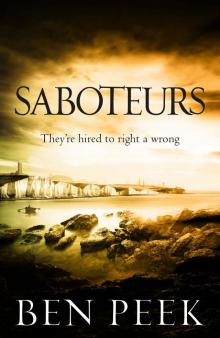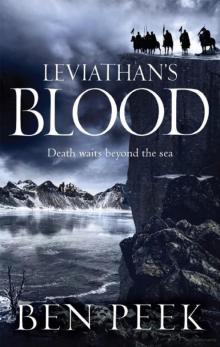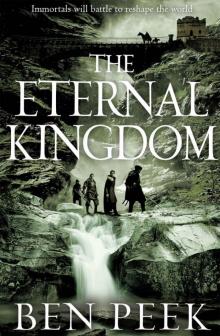The Godless Read online
The author and publisher have provided this e-book to you for your personal use only. You may not make this e-book publicly available in any way. Copyright infringement is against the law. If you believe the copy of this e-book you are reading infringes on the author’s copyright, please notify the publisher at: us.macmillanusa.com/piracy.
For my grandparents, Clifford and Muriel Mamwell
Acknowledgments
A novel is not just a collection of words. It is a collection of people, as well. My partner, Nikilyn Nevins, read this book in parts, in sections, in wholes. She listened to my worries and complaints. I would have left me, but she stuck it out and bought me beer. Tessa Kum (the Book Whisperer) and Kyla Ward (the Occult Expert) were the first readers, and both, I cannot thank enough. My agent, John Jarrold, was surely as surprised as I was by the reception—a piece of string is at least this long, I believe—but truly, none of it would have happened without him.
Lastly, a thank-you to my editor, Julie Crisp, and her American bad cop to her British good cop—it might have been the other way around on different days of the week—Pete Wolverton, without whom the book would have been a lesser creature. It would not, I feel the need to add, have had a decapitated head without either.
Contents
Title Page
Copyright Notice
Dedication
Acknowledgments
Map of the Known World
Map of Mireea
Epigraph
Prologue
Beneath the Skin
Chapter 1
Chapter 2
Chapter 3
Chapter 4
Chapter 5
Chapter 6
Chapter 7
The City Beneath
Chapter 1
Chapter 2
Chapter 3
Chapter 4
Chapter 5
Chapter 6
Chapter 7
The Boy Who Was Destined to Die
Chapter 1
Chapter 2
Chapter 3
Chapter 4
Chapter 5
Chapter 6
Chapter 7
Chapter 8
Chapter 9
Chapter 10
Chapter 11
In the Blood
Chapter 1
Chapter 2
Chapter 3
Chapter 4
Chapter 5
Chapter 6
Chapter 7
Chapter 8
A Small Kindness
Chapter 1
Chapter 2
Chapter 3
Chapter 4
Chapter 5
Chapter 6
Chapter 7
Chapter 8
Chapter 9
Chapter 10
Chapter 11
In a Town Called Dirtwater
Chapter 1
Chapter 2
Chapter 3
Chapter 4
Chapter 5
Chapter 6
Chapter 7
Chapter 8
Chapter 9
The General
Chapter 1
Chapter 2
Chapter 3
Chapter 4
Chapter 5
Chapter 6
Chapter 7
Chapter 8
Blood Ties
Chapter 1
Chapter 2
Chapter 3
Chapter 4
Chapter 5
Chapter 6
Chapter 7
Chapter 8
Chapter 9
The Woman Made from Fire
Chapter 1
Chapter 2
Chapter 3
Chapter 4
Chapter 5
Chapter 6
Chapter 7
Chapter 8
Chapter 9
Chapter 10
Chapter 11
The Important Garden
Chapter 1
Chapter 2
Chapter 3
Chapter 4
Chapter 5
Chapter 6
Chapter 7
Chapter 8
The Circumstances of Birth
Chapter 1
Chapter 2
Chapter 3
Chapter 4
Chapter 5
Chapter 6
Chapter 7
Chapter 8
Chapter 9
The Dead
Chapter 1
Chapter 2
Chapter 3
Chapter 4
Chapter 5
Chapter 6
Chapter 7
Chapter 8
Chapter 9
Chapter 10
Epilogue
Chapter 1
Chapter 2
Chapter 3
About the Author
Copyright
Let us start at the beginning, shall we?
With the start that was the end.
—Qian, The Godless
Prologue
The Spine of Ger had been made from stone, by hand. It ran across the Mountains of Mireea, along its peaks and valleys, an uninterrupted length that followed the vertebrae of the dead god, Ger, who lay beneath the mountains. The being who had been known once as the Warden of the Elements had been a giant whose head cleared the clouds, a figure that had been stationary until the final decades of his long life. His dark, scarred hands had held long, spiked chains with collars that, upon his fall, tore apart the land and created the crevasse that his long body would lie in. For hundreds of years after, his voice was heard in the rustle of leaves around him, in the storms above, in the floods of rivers and the crackle of fire that began by lightning. It continued long after Ger had finished building the mountain range around himself, a tomb wormed with mineral rich excesses to hide his ravaged body, but died long before the last brick of the Spine had been laid. In the eleven thousand years since that final stone had been placed, only the roots of ancient trees had caused the Spine to alter its shape—large roots lifting stone, or hollowing earth beneath—though none had broken its flow and it stood now, old and weathered, its construction as subject to fiction as the god beneath it, the stone patterned green by mold and moss when covered and bleached by the sun’s exposure where the old, thick canopy fell away.
Bleached by Sei’s cracked palace, the young soldier, Ciron, corrected himself as he looked up through the branches, at the second of the three suns that rose as the first set. The midday’s sun rises, the morning’s sun sets, but it is just the remains of the Sei’s home orbiting the bones of the God of Light himself. His horse walked beneath a thick, low branch, and he shifted around it. Sei had been the first god to kill another, though it had not been Ger, but rather Linae, the Goddess of Fertility. That act had begun the War of the Gods, though no one knew why he had done so, not even after so many generations. In class, the teacher—a young man who wore narrow, thick glasses that Ciron himself had envied—had argued that it had been a lover’s fight. Why should the gods be so different from them, he said, and the class had agreed, much to Ciron’s distress. Even at the age of five and ten, he had known that such a simplistic answer was inherently flawed, based as it was in the desire of the individual to see him or herself in the divine. He had spent a lot of time reading about the gods, spending hours in Yeflam’s public libraries, and he knew that the gods had not been like them, knew that they had not been human, and that the reasons for their war were so difficult to understand because their very experience of life was so alien to that of any dreamed by humanity.
“Boy, you’re daydreaming again.”
“I’m sorry.”
His voice sounded young, nasal and strained, and he heard a grunt from the older man ahead of him. “Don’t apologize, jus
t pay attention,” Ira said. “The trail is leading to the flooded shafts.”
“Then it’s leading nowhere?”
“Don’t be smart, boy.” The other spat a stream of tobacco to his left. “What do you think will happen at the end of this trail if the raiders are standing there?”
Nothing.
No one would be standing there. Ciron knew that, so did Ira, but the young soldier was being paid to pretend otherwise. The thought made him angry, but he had not been in the Mireean Guard long enough to say that, especially to someone as senior as Ira. Besides, since Ciron had arrived, he had felt like he had been carrying a black mark because of how he had come to Mireea, the large city state that had formed itself behind one part of the Spine of Ger. Unlike the other new recruits who were drawn from the city, he had arrived from the Floating Cities of Yeflam, a letter in his hand, a week after his sixteenth birthday, a week after his father had told him that he had purchased a rank in the Mireean Guard for his eldest son. On the day that he had said it, Ciron had thought that his father had meant it as a joke. Surely, his father was not going to send him to a city where all talk of the gods was based on fear, and would instead send him to the Universities in Yeflam, to study theology beneath the Keepers from the Enclave, to become the scholar that he dreamed of. But no, in a humbling moment, Ciron realized that his father had no desire to send him there, did not have the political will to admit to his peers that his son was a scholar, not a soldier, and so had done what others had done, and purchased him a rank in Mireea.
“Remember,” his barely literate father had said, the day after his birthday, “that you are our ambassador to Mireea, our hope and our future. Everything you do reflects upon us.”
For the first time in his life, he had almost agreed with his father and told him exactly how it did reflect on him, but his mother had stood beside the short man and one pleading look from her had seen him swallow his bitter words.
Yet, his father’s decisions had proved worse than Ciron had originally thought. The raids by Leera against Mireea and its outlying villages had begun to escalate into a war by the time he rode up to the Spine of Ger, and whatever safe, easy position he had hoped to find had been stolen from him in the first week. The sword he had been given was too heavy in his hands, the armor he wore had bruised his shoulders, and the rank his father had purchased one step up from a squire. Before the first week was out he saw his first fight, felt sick during it, was sick after it, and managed to stay alive only because of those in his unit. To further insult him, on the trail back to Mireea, his unit had met the mercenary group Steel, a replacement for an earlier group, Mirin, which had left under a controversy he had never had explained to him. Yet, in Steel’s ranks were fighters as young as he, boys and girls already veterans, each one a rising star of a cheap fiction where he would be placed, in contrast, as a boy in need of rescue.
Rocks skittered before him as Ira’s horse slipped, but the soldier was a decent rider, and his stocky body kept it under control. Ciron, only slightly more inept a rider than he was a swordsman, let his horse navigate the short drop, stroking her neck and murmuring his thanks when they emerged without stumble. She was an older horse, brown and white, a sturdy child’s horse. He had sighed when the sergeant had led her out for him, but the tall man—who had seen and anticipated the response—had said, “She knows the mountains as well as any of the men and women you’re with. If you get lost, she will return here. When you’re a little firmer on the land up here and a little better with the horses, I’ll find you a new mount, but until then, she will keep you alive.” Since then, Ciron had been thankful with the choice. He had gotten lost twice already, only to have the horse lead him back to the unit. After the second time, Corporal Jennis had threatened to tie him to Ira’s saddle if it happened again, and he had flushed beneath her anger, impotent to respond.
“Boy?” Ira said. “You still with me?”
“Yes.”
“You didn’t answer my question.”
Ciron caught a bug on his neck, wiped the bloody smear away. He did not remember hearing a question, though to do so would mean admitting that he had been daydreaming, again … “Sorry, I did not hear.” He began to say something else, but stopped and shrugged. “Sorry.”
“Don’t apologize so much.” Ira spat to his right this time. “I was asking if you’d been to Leera.”
“No.”
“Travel is hard there during the wet season, but that’ll be over, soon.” Above the pair, the green tinted canopy began to lighten. “We’ve been seeing their raiders coming up here more and more as the season draws to a close. Things are going to get worse than what we just left.”
Ciron could hardly imagine anything worse. With half the week gone and the other half to come, his unit had found the burned-out village midway through their patrol, the morning’s sun a solitary dot high in the sky. Following trails of smoke, they had found the remains of twenty-seven men and women laid out around a huge cooking pit, one woman on a spit above it. Ciron had been sick at the sight and smell, and though he had seen it before, he felt no shame—for even now, he could see the looks of revulsion on the faces of the others around him, and knew they were close to vomiting as well. It had also got him sent out of the village: the Corporal had sent him out with Ira to follow a trail two hours old, a trail that all knew would end in nothing.
The sound of a waterfall emerged and Ira slowed his horse at the edge of the canopy. When Ciron drew next to him, he saw the clearing the other man was examining. There, the green light gave way to the bright heat of the midday’s sun, leaving it looking briefly washed out and sun faded. In the center of the opening waited a decaying wooden cover over an old tunnel, but the tracks went around it to the edge where the drop there led to the river and the waterfall that began it. After what felt like an hour, Ira slipped from his horse and, with one hand on his sword, entered the clearing.
Ciron followed, stopping at the cover. “You don’t think they went into the tunnels, do you?” he asked.
“It’s flooded, boy.”
“But—”
“Look if you want.”
Carefully, he reached for the cover. The wood cracked beneath his fingers, but it shifted, and the sun’s light caught on the murky water.
The tunnels were mineshafts, sunk deep for gold, the gold that had given rise to Mireea and its first fortune. They were empty, now, but when they had given out gold, the mines had killed as many as they had made rich; now they just killed when people—children mostly—fell into the abandoned and flooded holes. People still believed that there was gold in the mountain, and there was, Ciron knew, if you knew where to look. In the second week of his time in the Mireean Guard he had heard that the Captain of the Spine was going to send divers into the flooded tunnels, and he had tried to get assigned to that duty to look for his gold, but the sergeant had shaken his head. He said that most ended in dirt and cave-ins, and that there was only the possibility of raiders, not gold, but he had misunderstood why Ciron had wanted to go. Some of the mines broke into the old cities beneath Mireea, the cave cities that men and women had built to honor Ger in the years after his fall. They were dark, haunted relics, boxed in by intentional cave-ins from the last days of those people, but it was rumored that if you went deep enough, you could find the remains of Ger himself.
Leaving the broken openings, Ira walked the edge of the clearing. “No, they went to the edge and then their tracks stop. It looks like they leaped over.”
Ciron approached, timid in his approach to look out and over at the waterfall, at the massive drop. “They didn’t, though,” he said. “There’s a few scuffs here, where they went to the left.”
“Yeah.” The other man sounded pleased. “Tell how many there are?”
“Two?”
“Three, at most. Not the fifteen we’ve been following.”
“That’s no different than before.”
“No, it’s not,” Ira said. “Come on, the C
orporal will want us back before the afternoon’s sun is up.”
The fact that he had been right did not give Ciron pleasure. At school, proving himself had been important—necessary, even. He had needed excellent marks to prove to his father that he was dedicated to an academic pursuit, needed them to break down his resistance to the Enclave and the teaching that took place there. He saw the men and women who made up the ruling body of Yeflam as abominations. “Cursed,” he said, once, when Ciron had been younger. “That’s the name we ought to give them officially. They’re not Keepers of the Divine. They’re cursed. They are the shattered sun and the black ocean of people, the burden that ordinary people have to carry.”
An older Ciron had examples to counter him, had arguments to make, but his younger self had sat at the dinner table and stared at his plate. “I know you think I’m stupid,” his father had said, the silence of his family an awfully familiar one in the face of his rages. “But when you’re older and you step out of the Floating Cities, you will talk to witches and warlocks and you’ll hear a different story about the gods. You’ll hear that they aren’t dead like you and me, but that they’re both dead and alive, that they have been dying for over fifteen thousand years, with their blood spilling into the ground, into the water, and into the air; spilling so that we breathe it and drink it and wade through it daily. That’s how the cursed get their powers—that’s why they’re such a danger to us. Outside Yeflam, people aren’t confused about that.”
The silence between Ciron and Ira stretched out for the ride back to the village, the former thankful that the latter had not asked him any questions. Yet, soon, the younger solider noticed that the silence between the two of them had extended, that it had now come to take the air, drowning out the susurration of insects and animals, the sound of mountain’s breath. The leaves on the trees did not shake, did not drop, and the green-tinted light showed the thick, damp patches on Ciron’s jerkin, the sweat of fear.
It was only when the horses began to hesitate in their steps that Ira finally stopped.
Cast in a shadowed green, the soldier ran his thick fingers through his hair and flicked out the moisture. Slowly, he slid from the saddle. “Tie the horses here.”
“Are you—” Ciron stumbled, cleared his throat. “Are you sure?”

 Saboteurs
Saboteurs The Godless
The Godless Leviathan's Blood
Leviathan's Blood Dead Americans
Dead Americans The Eternal Kingdom (The Children Trilogy Book 3)
The Eternal Kingdom (The Children Trilogy Book 3)